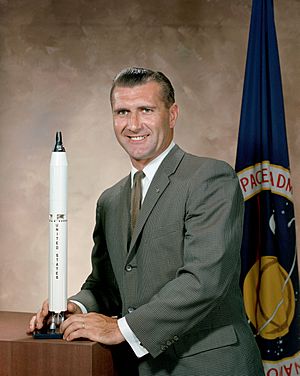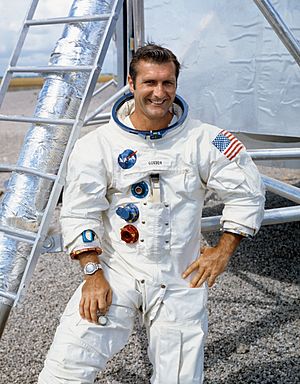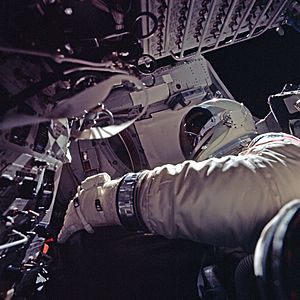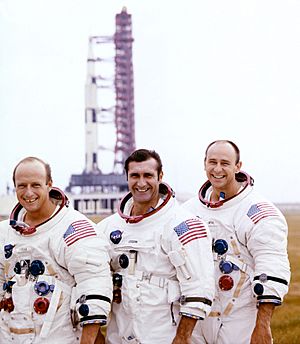Richard F. Gordon Jr. facts for kids
Quick facts for kids
Richard F. Gordon Jr.
|
|
|---|---|
 |
|
| Born |
Richard Francis Gordon Jr.
October 5, 1929 Seattle, Washington, U.S.
|
| Died | November 6, 2017 (aged 88) San Marcos, California, U.S.
|
| Nationality | American |
| Other names | Dick Gordon |
| Alma mater | University of Washington (B.S. 1951) Naval Postgraduate School |
| Occupation | Naval aviator, test pilot |
| Awards | Distinguished Flying Cross (2) Distinguished Service Medal NASA Distinguished Service Medal NASA Exceptional Service Medal |
| Space career | |
| NASA Astronaut | |
| Rank | |
|
Time in space
|
13d 03h 53m |
| Selection | 1963 NASA Group 3 |
|
Total EVAs
|
2 |
|
Total EVA time
|
2 hours 41 minutes |
| Missions | Gemini 11, Apollo 12 |
|
Mission insignia
|
|
| Retirement | January 1, 1972 |
Richard Francis Gordon Jr. (born October 5, 1929 – died November 6, 2017) was an American Navy officer, pilot, and NASA astronaut. He was also a chemist and a test pilot.
Gordon was one of only 24 people who have traveled to the Moon. He flew as the pilot of the Command Module during the 1969 Apollo 12 mission. On this mission, he orbited the Moon 45 times. Before his trip to the Moon, Gordon flew in space as the pilot of the 1966 Gemini 11 mission.
Contents
Biography
Early Life and Education
Richard Francis Gordon Jr. was born in Seattle, Washington, on October 5, 1929. He was the first of five children. His father, Richard Francis Gordon Sr., was a machinist, and his mother, Angela, was an elementary school teacher.
As a boy, he was a Boy Scout and achieved the rank of Star Scout. He finished high school at North Kitsap High School in Poulsbo, Washington, in 1947. After that, he went to the University of Washington. In 1951, he earned a degree in chemistry.
Gordon joined the United States Navy. In 1953, he earned his wings as a Naval Aviator. He then went to flight schools for all-weather flying and jet planes. After his training, he joined a fighter squadron in Naval Air Station Jacksonville, Florida.
In 1957, he attended the United States Naval Test Pilot School in Naval Air Station Patuxent River, Maryland. He worked as a flight test pilot until 1960. During this time, he tested several fighter jets, including the F4H-1 Phantom II. He was the first test pilot for the F4H-1.
He also worked as a flight instructor for the F4H-1. He helped introduce this aircraft to the Navy's Atlantic and Pacific Fleets. Gordon flew more than 4,500 hours, with 3,500 hours in jet aircraft.
In May 1961, he won the Bendix Trophy race. He flew an F4H-1 from Los Angeles to New York City. He set a new speed record of 869.74 miles per hour. He also set a record for crossing the country in 2 hours and 47 minutes.
NASA Career

NASA chose Gordon as one of the third group of astronauts in October 1963. He had been considered for the second group of astronauts in 1962.
Project Gemini Missions
Gordon was the backup pilot for the Gemini 8 mission. In September 1966, he made his first space flight. He was the pilot of Gemini 11, flying with Pete Conrad. This flight set an altitude record of 1,369 kilometers (851 miles). This is still the highest Earth orbit ever reached by a crewed mission.
Gordon and Conrad were already good friends. They had been roommates on the aircraft carrier USS Ranger. During the Gemini 11 flight, Gordon performed two spacewalks. He attached a tether to the Agena spacecraft. He also collected a science experiment package.
Apollo Program Missions
After Gemini, Gordon became the backup Command Module Pilot for Apollo 9. In November 1969, he flew as the Command Module Pilot for Apollo 12. This was the second mission where humans landed on the Moon.
While his crewmates, Pete Conrad and Alan Bean, landed in the Ocean of Storms, Gordon stayed in orbit around the Moon. He was aboard the Command Module, named Yankee Clipper. His job was to take pictures of possible landing sites for future missions.
After Apollo 12, Gordon was assigned as the backup Commander for Apollo 15. He was supposed to walk on the Moon as the Commander of Apollo 18. However, that mission was canceled due to budget cuts.
Gordon spent a total of 315 hours and 53 minutes in space. Of this time, 2 hours and 41 minutes were spent on spacewalks. He retired from NASA and the U.S. Navy in January 1972.
Astronaut Office Work
After his space flights, Gordon worked in the astronaut office at NASA. In 1971, he became the chief of advanced programs. He helped with the design of the Space Shuttle.
Post-NASA Career
After leaving NASA, Gordon worked in different fields. From 1972 to 1976, he was an Executive Vice President for the New Orleans Saints professional football team. He also worked in the oil and gas industry.
In 1984, Gordon was a technical advisor for a CBS miniseries called Space. He also played a small role in the show as "Capcom."
Gordon was involved in many charity organizations. He served as Chairman for the Louisiana Heart Fund and the March of Dimes. He was also on the boards of directors for the Boy Scouts of America and the Boys' Club of Greater New Orleans.
Personal Life and Death
Richard Gordon had six children with his first wife, Barbara Field. Their marriage ended in divorce. Barbara died in 2014.
Gordon passed away in San Marcos, California, on November 6, 2017. He was 88 years old. He was survived by five of his children and his siblings. His second wife, Linda, had passed away shortly before him in September 2017. Gordon enjoyed water skiing and golf in his free time.
Organizations
Gordon was a member of several important organizations. He was a fellow of the American Astronautical Society. He was also an associate fellow of the Society of Experimental Test Pilots. He was a member of the Navy League.
Awards and Honors
Richard Gordon received many awards and honors throughout his career:
- Navy Astronaut Wings
- NASA Distinguished Service Medal
- NASA Exceptional Service Medal
- Bendix Trophy in 1961
- Two Navy Distinguished Flying Crosses
- Navy Distinguished Service Medal
- Phi Sigma Kappa Merit Award in 1966
- Institute of Navigation Award for 1969
- Godfrey L. Cabot Award in 1970
- Rear Admiral William S. Parsons Award for Scientific and Technical Progress in 1970
- Manned Spacecraft Center (MSC) Superior Achievement Award
- NASA Group Achievement Award
- Richard Gordon Elementary School in Kingston, Washington was named after him.
In 1982, Gordon was inducted into the International Space Hall of Fame. He was inducted with nine of his fellow Gemini astronauts. On March 19, 1993, he was also inducted into the United States Astronaut Hall of Fame.
In Media
In the 1998 HBO miniseries From the Earth to the Moon, Richard Gordon was played by actor Tom Verica.
Images for kids
-
The grave of Captain Richard Francis Gordon Jr. at Arlington National Cemetery.
See also
 In Spanish: Richard F. Gordon Jr. para niños
In Spanish: Richard F. Gordon Jr. para niños
 | Bayard Rustin |
 | Jeannette Carter |
 | Jeremiah A. Brown |






